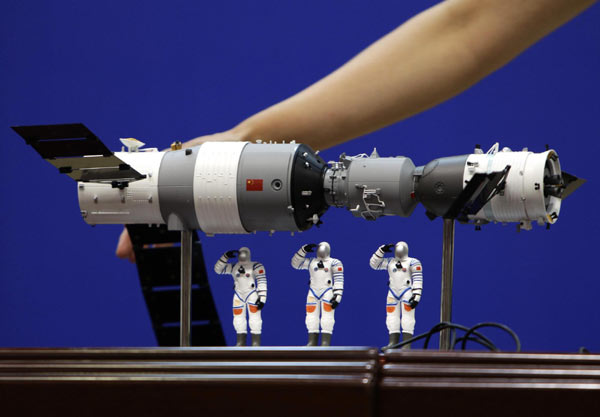
 |
| A model of the Shenzhou-9 manned spacecraft ( R) docking with the orbiting Tiangong-1 space lab module (L) and three Chinese astronauts is displayed during a news conference at Jiuquan Satellite Launch Center, in northwest China's Gansu province, June 15, 2012. [Photo/Agencies] |
JIUQUAN - China will conduct space medical experimental research on Tiangong-1 space lab module in the upcoming manned space flight, China's manned space program spokeswoman Wu Ping said Friday.
It is a key task to ensure the astronauts' physical health and high working efficiency as the orbiting flight time will continuously increase in the later space station phase, Wu said at a press conference at the Jiuquan Satellite Launch Center.
During the upcoming manned space docking mission between the Shenzhou IX?manned spacecraft and the Tiangong-1, three major aspects of aerospace medical experimental research will be conducted, she said.
The first aspect is the health monitoring that mainly includes astronaut's nutrition and metabolism, moods, and biorhythm changes in orbit, she said.
The second is research on the physiological effects mechanism of weightlessness and the countermeasures, which include the impact study on the functions of astronaut's cardiovascular, vestibule and brain in the orbiting flight.
They will also study bone loss in space.
The third is research on environmental medicine and the astronaut's operational capability in space, Wu said.
By conducting these experiments, China will obtain data on the impact of weightlessness on the human body among other things, she said.
China is making its final preparations to send three astronauts, two male and one female, into space aboard Shenzhou IX?manned spacecraft to fulfill the country's first manned space docking mission.
Fueling of the upgraded Long March-2F carrier rocket will start Friday afternoon. The launch platform and all control systems are ready.
Astronauts are in good and stable condition and preparing for their space journey, according to China's manned space docking program headquarters.
Special Coverage: China to launch Shenzhou IX